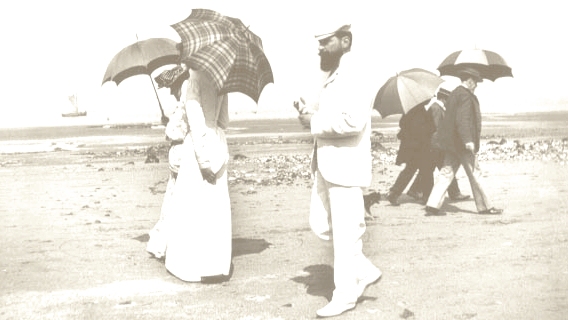Possibly not a hoax:
Even Bugs Bunny got in on the act; in the 1949 cartoon "Bowery Bugs," an old man is so charmed by the rabbit's tale of the famous bridge jumper Steve Brodie (Brodie's feat, alas, was a hoax) that he agrees to buy the bridge from him.
A turn-of-the-century confidence man named George C. Parker actually sold the Brooklyn Bridge more than once. According to Carl Sifakis, who tells his story in "Hoaxes and Scams: A Compendium of Deceptions, Ruses and Swindles," Parker - who was also adept at selling the Metropolitan Museum of Art, the Statue of Liberty and Grant's Tomb - produced impressive forged documents to prove that he was the bridge's owner, then convinced his buyers that they could make a fortune by controlling access to the roadway. "Several times," Mr. Sifakis wrote, "Parker's victims had to be rousted from the bridge by police when they tried to erect toll barriers."For You, Half Price
Gabriel Cohen/NYTimes/tnellen
-
Steve Brodie researcher/historian/cryptological-bibliographer David Shulman at the listserv of the American Dialect Society
obituary for David Shulman at the Scotsman.
Shulman insisted Brodie was legit.
-
Possibly:
Jack Johnson, the boxer, ran away from home in Texas at the age of 12 to go to New York and meet Steve Brodie.
Jack Johnson was denied first-class passage on the Titanic when he was challenging Tommy Burns on his way to becoming the first black Heavyweight Champion of the World - the steamship company would only offer him a second or third class birth, which he refused.
From Hickoksports biographies:
Johnson was determined to become world champion. He took a major step toward the title by knocking out former champion Bob Fitzsimmons in the 2nd round on July 17, 1907. Tommy Burns, who had won the championship the previous year, went on a tour of England and France. Johnson followed him.Johnson was, unbeknownst to me til just now, the subject of a film by Ken Burns - Unforgivable Blackness.
He finally caught Burns in Australia, where a promoter named Hugh D. "Huge Deal" McIntosh put up a guarantee of $30,000 for a Burns-Johnson match. Burns accepted. McIntosh refereed the fight, which took place on December 26, 1908--"Boxing Day" in Australia.
The 6-foot-1, 200-pound Johnson had a large advantage in reach over Burns, who was the shortest heavyweight champion ever at only 5-foot-7. Johnson gave Burns a thorough battering before a police inspector stepped into the ring to stop the fight in the 14th round.
When Johnson returned to the United States, a search began for a "Great White Hope" who could win the title from him. Former champion James J. Jeffries was finally persuaded to come out of retirement, but he was out of shape and Johnson toyed with him before knocking him out in the 15th round on July 4, 1910, at Carson City, NV. The victory sparked race riots across the country, in which nineteen people were killed.
Johnson's second wife committed suicide in September of 1912 and he married a young white woman three months later. That was the last straw for white authorities. Johnson was sentenced to a year in prison for violating the Mann Act, which forbade transportation of a woman across state lines for immoral purposes.
-
Leadbelly did a great tune called "Titanic" with these lines in it, as I remember them from the Koerner, Ray, and Glover version:
Jack Johnson went to get on board-
the cap'n said "Jack,
we don't haul no coal"
fare thee Titanic, fare thee well
say midnight on the sea
and the band playin' "Nearer My God To Thee"
fare thee Titanic, fare thee well
Spread lifeboats all around
save the women and the children
let the men go down
fare thee Titanic, fare thee well.
Chuck Berry was busted under the Mann Act as well, and by the same mentality if not the same men, and for much the same reasons.
Berry's tune Nadine has the unforgettably perfect lines:
I saw her from the cornerThe essence of diplomacy, even in the primeval south of Berry's mid 20th c. Memphis Tennessee, has always been discretion - the oblique gesture, the calmly uttered phrase, reserve.
when she turned and doubled back
An started walkin' toward a
coffee-colored cadillac
I's pushin' through the crowd
tryna get to where she's at
Cam-paign shoutin'
like a southern diplomat
Southern Democrats, however, were renowned for their bombast, histrionic filigree, and rhetorical volume.
It's unthinkable that a poet with Chuck Berry's command of the language would have done that on his own, but it's easy to imagine someone in the music industry's demanding Berry shift his lyric focus a little, to avoid any consequent problems.



